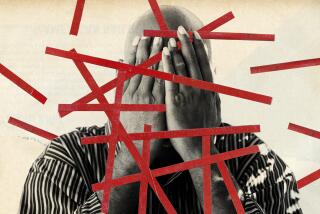Trading Places in the Psych Unit
- Share via
One difference between staff and patients on the psychiatric unit is supposed to be this: Staffers can function when patients cannot. On our unit, though, all that has gone topsy-turvy.
Staffers are supposed to be healthier, luckier and the owners of stronger psychological defenses. These defenses are a measure of mental health; they prevent indefensible anxiety. The more successful among us use altruism, intellectualization and humor to get a great deal done. The less successful use delusions and hallucinations. Throughout the course of a lifetime, we place our particular sandbags against the advancing enemy world.
After the terrorist attacks of Sept. 11, we held a community meeting at the state hospital where I work. The usual hierarchy had collapsed. Doctors knew no more than anyone else about what had happened, which meant there was unity in fear. And, for a moment, the sickest were wrenched straight into sanity.
One patient, who usually spoke in word-salad, asked with perfect diction when Boston would disappear. Another pointed out that all the soap operas had been canceled. A new patient wept and said, “I was the leech between the legs of Desert Storm. I hope I’m not involved in this.” Her neighbor, a schizophrenic, reassured her that this was a ridiculous idea, a crazy idea. His lucidity was astounding.
Since then, with few exceptions, the patients are functioning--at least, in their ways. No one has needed more sleep medication, the restraint beds are no fuller than usual, and even individual delusions have not been updated. The man convinced that he has been on the hit list of the Hells Angels for years, has not fitted his persecutors with turbans. The hand-washing patient, rubbing her skin off each morning “in order to decontaminate it,” is not worried about anthrax. You might expect that the sick would grow sicker, the paranoid more vigilant and the depressed suicidal. But their defenses--those dense, reliable buffers--are working again.
Ours are not. The nurse who took an annual trip to an unpronounceable place, while the rest of the staff vied for her postcards, is no longer flying. The social worker forgets names in the middle of meetings and gazes out windows when people are talking to him. We are all more irritable and less tolerant. Our adaptive defenses are missing.
Why are the healthy undone and the sick unchanged? Psychosis is not a serene place to live, but it is utterly involving, utterly self-absorbed; a state of mind that fiddles while the universe goes up in flames. In this paradoxical moment, the defenses of the very ill are stronger than ours. They go about their business; we cannot.
A recent memo from the chief of psychiatry circulated among staff. It was meant to reassure. In case of bioterrorism, it said, there was no need to panic. If evacuation was necessary, the local Fire Department would direct all hospital actions.
A senior nurse copied the memo. She went from staff member to staff member, reading it aloud and laughing. “The Fire Department,” she said, “That makes me feel good. They’ll know just where to put 170 locked-door patients.” With each reading, her laugh was a bit shriller. Humor is a higher defense, but there was no humor in the sounds she made.
Yet, for the patients, life goes on much the same. Their questions and concerns are unchanged. It is remarkable. The young woman, Ms. K, who exfoliates each hand each morning in order to remain pure, has been in the hospital for years. She does not know where she ends and someone else begins.
A pregnant nurse recently began to work on the ward. On her first day, Ms. K. approached and circled her. She took two pas de deux steps near, three pirouettes away, two near, three away, two near again, peering all the while at the belly in front of her.
“Hello,” she said. “Are you pregnant?”
The nurse nodded. “I am,” she said. You could hear the joy and, given the times, fear in her voice.
Ms. K. mulled, stepping back and forth. Many of us would be thinking about this double-headed blessing, the poignancy and the danger of bringing life into the present world. But Ms. K. wasn’t. She had something far more important to clarify.
“I see,” she said, and did a little dance. “Well, if you’re pregnant, am I?”
Seeking Submissions
The Health section is seeking submissions from physicians for its Doctor Files column, a monthly feature that explores the art of medicine. The column strives to illuminate the human aspect of medicine and how medicine is changing.
Submissions, which should be 800 to 900 words, can be sent by e-mail to health@latimes.com or to Doctor Files, Health, Los Angeles Times, 202 W. 1st St., Los Angeles, CA 90012. Include phone numbers. Submissions cannot be returned.


